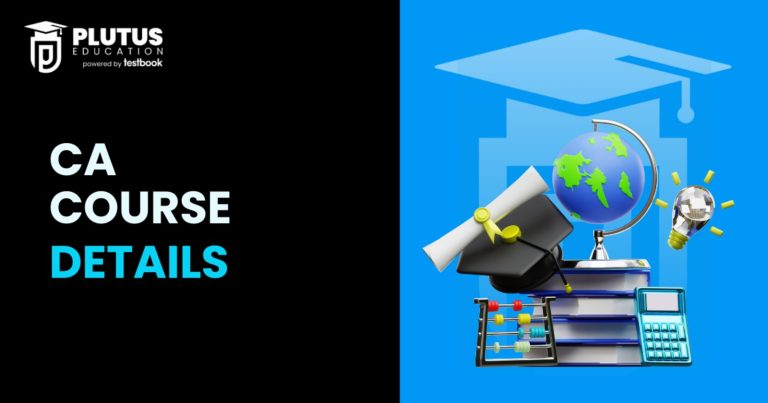The Chartered Accountant course is one of the most prestigious and rewarding professional qualifications in India. The Institute of Chartered Accountants of India, ICAI, governs it. This course trains people in accounting, auditing, taxation, and other areas of financial management.
The CA course is structured into three key levels: CA Foundation, CA Intermediate, and CA Final. Additionally, it includes practical training known as Articleship.Becoming a Chartered Accountant is very challenging. Conversely, considering the career prospects and handsome returns, it is one of the most sought-after professions not only in India but globally as well. Whether you are a class XII pass student or a graduate requiring a satisfying profession, the CA course gives you an ideal platform to achieve professional success.
What is CA?
CA full form is Chartered Accountant. This course is a professional program for dealing with complex financial and taxation matters. The student will acquire expertise in a deep understanding of subjects like accounting principles, auditing, tax laws, corporate finance, and business regulations. It is considered to be the most highly valued qualification across the globe for any finance professional.
The course CA is operated by ICAI, wherein the student obtains both theoretical as well as practical knowledge. So, it will have three stages:
- CA Foundation: The first and entry-level to start with the course for the students after completion of class XII.
- CA Intermediate: IPCC It is the mid-level course that is available to the students, who have successfully cleared the foundation exam or taken through the direct entry route at the end of graduation.
- CA Final: It is the last and highest level of the course.
- Besides passing such tests, students have to undergo 3-year training in Articleship. This practical exercise gives real exposure to students dealing with accounting, auditing, and taxation; hence empowering them for a proficient career.
The CA qualification is very diversified because it provides options for practice in various industries like corporate finance, public practice, or even entrepreneurship.
Why Pursue a Chartered Accountant Course?
One of the most important decisions that a student interested in finance, accounting, and taxation would make is to choose CA or not. A course in CA provides enormous professional growth, financial stability, and worldwide recognition. Unlike any other professional course, this particular one provides theoretical expertise and practical experience due to its specific structure. The main reason for choosing a CA course is the credibility and respect associated with the position. A CA is viewed as a financial expert and holds an important position in businesses regarding compliance with all laws and dealing with accounting management. Therefore, giving this degree ensures not only sound and stable career opportunities but many laurels too.
The average salary for freshers at Indian banks is around ₹6-12 Lakhs a year. However, it’s surely going to grow multi-fold with the work experience. This is especially true for specialties such as those in high demand at the moment – international forensic and tax or financial management. It is also accepted internationally, which has made it highly in demand. CAs often join multinational companies, follow international career options, or start their practice. The exposure they would get from the course is the primary focus of the course; hence they are industry-ready at qualification.
If you wish to search for CA course details after 12th you will surely come up with a course that allows financially ambitious students a structured path and, in the case of graduates, an accelerated route to success.
CA Eligibility Criteria
A study of the CA eligibility criteria is one of the critical steps before entering the CA program. The course is available to students who complete Class XII besides graduates and postgraduates. Based on one’s educational qualifications, there are mainly two routes leading to entry to the course,
- Foundation Route: For students entering CA from class XII.
- Direct Entry Route: Open to graduates and postgraduates who meet the percentage criteria.
Both pathways have requirements to ensure that the students are well-prepared for the challenges of the course.
CA Foundation Eligibility Criteria
CA Foundation is the entry-level course in the Chartered Accountancy program for students who have passed Class XII. To register for the CA Foundation, the following requirements are necessary:
- You must have passed Class XII from a recognized board. Students can register for the CA Foundation course with ICAI after passing their Class XII exams.
- However, the registration should be done at least four months before the Foundation exam.
- Students have ample time to prepare for the exam since it is conducted twice a year in May and November.
- There is no minimum percentage requirement for registration in the CA Foundation, and students from all streams can apply.
For those interested in CA course details after 12th, the Foundation level is a structured introduction to accounting and finance concepts. It lays the groundwork for the Intermediate and Final levels.
CA Intermediate Eligibility Criteria
The CA Intermediate is the second stage of the course. It consists of more advanced subjects. This can be enrolled either after clearing the CA Foundation exam or by taking the Direct Entry route if one is a graduate or postgraduate. If you have appeared for CA Foundation, you would automatically be qualified to register yourself for CA Intermediate. However, if you are either a graduate or a postgraduate candidate, you shall have to enroll directly on these percentages:
- Commerce graduates: The minimum aggregate is 55% of marks.
- Non-Commerce Graduates: A minimum of 60% marks in aggregate.
- You should also register for the Intermediate course at least eight months before the exams. This will give you enough time to prepare for the rigorous syllabus.
CA Final Eligibility Criteria
The CA Final is the last and most demanding level of the Chartered Accountancy course. To become eligible for this level, one must clear both groups of the CA Intermediate exam. One is also required to complete at least 2.5 years of Articleship training. There are also some training programs mandated by ICAI, for which the students have to be present before appearing in the Final exam. These training programs are- AICITSS-Advanced Integrated Course on Information Technology and Soft Skills. You will be at a significant practical level by the time you reach the Final, making it easier to understand and apply advanced concepts.
CA Admission Process
The admission procedure for the CA course varies in case you join after Class XII (Foundation Route) or are a graduate (Direct Entry Route). The ICAI has made the procedure so smooth that students can get registered and move on to becoming Chartered Accountants. For students who begin after Class XII, the very first step would be to enroll in the CA Foundation course. Once they clear the Foundation exam, then it’s a straight shot towards the CA Intermediate level, Articleship training, and then the Final exam. In the case of graduates, though, it’s a little different as they are eligible for direct entry to the Intermediate level through the Direct Entry route. For those interested in bcom ca course details, the admission process is the same, with graduates required to meet specific percentage criteria.
CA Course Duration
The duration of the CA course varies with your entry point. If you join after Class XII through the Foundation Route, the course will take around 4.5 to 5 years to complete. This includes the time spent on Articleship training, which lasts for three years. This will be for students who have joined the course via the Direct Entry route. Since the course takes only about 3 to 3.5 years, students entering the course via this route do not need to take the Foundation level, as they join the Intermediate level. Good time management and continuous preparation will determine the end.
CA Course Fees
CA is one of the cheapest professional courses in India. The overall amount for the CA course, consisting of registration fees, examination fees, and training, ranges from ₹80,000 to ₹1,00,000. This course will be accessible to students coming from every financial background.
The following charges are applied to each level of this course.
- CA Foundation– approximately ₹16,000 (with charges of registration along with training fee).
- CA Inter- ₹34,000–₹36,000 with both groups together with training charges.
- CA Final: ₹35,000–₹37,000(inc. registration as well as the training fees)
The CA Course is affordable while providing a big return on investment that the freshers get competitive wages and the practitioners receive even handsome pay packages after experience.
CA Syllabus
The syllabus of the CA course is vast and extensive and covers all aspects of finance, accounting, taxation, and auditing. It prepares students for the practical challenges they will face in their professional careers.
| Level | Group | Subjects |
| CA Foundation | – | Principles and Practice of Accounting |
| – | Business Laws and Business Correspondence and Reporting | |
| – | Business Mathematics, Logical Reasoning, and Statistics | |
| – | Business Economics and Business and Commercial Knowledge | |
| CA Intermediate | Group 1 | Accounting |
| Corporate and Other Laws | ||
| Cost and Management Accounting | ||
| Taxation | ||
| Group 2 | Advanced Accounting | |
| Auditing and Assurance | ||
| Enterprise Information Systems and Strategic Management | ||
| Financial Management and Economics for Finance | ||
| CA Final | Group 1 | Financial Reporting |
| Strategic Financial Management | ||
| Advanced Auditing and Professional Ethics | ||
| Corporate and Economic Laws | ||
| Group 2 | Strategic Cost Management and Performance Evaluation | |
| Elective Paper (Choose One: Risk Management, International Taxation, etc.) | ||
| Direct Tax Laws and International Taxation | ||
| Indirect Tax Laws |
CA Foundation Subjects
CA Foundation level is the entrance level to the Chartered Accountancy course. It is aimed at introducing the basic principles of accounting, business, and economics to the students. This will help in the foundation of building up complex topics in the later stages. The CA Foundation syllabus is categorized into four main subjects:
- Principles and Practice of Accounting: This course emphasizes the basic knowledge and concepts of accounting. Students will learn how financial statements are prepared and presented, inventory valuation and depreciation, accounting for partnerships, etc. This helps to get ready for complex accounting courses that can be pursued further.
- Business Laws and Business Correspondence and Reporting: Business Laws and Business Correspondence and Reporting consist of two parts:
- Business Laws: Deals with the Indian Contract Act, Sale of Goods Act, and Partnership Act. All these are a must to understand how businesses operate legally.
- Business Correspondence and Reporting: Focuses on the development of communication skills, which includes report writing, drafting letters, and presentations—all essential skills for professionals.
- Business Mathematics, Logical Reasoning, and Statistics: This subject ensures that students grow with quantitative as well as analytical skills. Areas covered include the time value of money, probability, permutations, combinations, logical puzzles, as well as ratios. These would be important parts of financial analyses and decision-making.
- Business Economics and Business and Commercial Knowledge:
- Business Economics: Introduce the basics of microeconomics and macroeconomics. Students are taught about demand and supply, production cost, and kind of market.
- Business and Commercial Knowledge: It gives information about the business environment, including key sectors, organizations, and policies that shape the economy.
CA Intermediate Subjects
The subjects under the CA Intermediate level include the core financial areas and practical exposure, which are divided into two groups:
Group I
- Accounting: Concentrates on the company accounts and special transactions.
- Corporate and Other Laws: The Companies Act, 2013, and other general business laws.
- Cost and Management Accounting: Cost control, analysis, and decision-making are explained.
- Taxation: Covers Income Tax and GST laws relating to individuals and businesses.
Group II
- Advanced Accounting: Concentrates on advanced accounting, such as amalgamation and consolidation.
- Auditing & Assurance: It introduces audit processes, procedures, and standards
- Enterprise Information Systems & Strategic Management: Explores IT systems and business strategy.
- Financial Management & Economics for Finance: Teaches financial planning, budgeting, and economic policies.
CA Final Subjects
The CA Final is the advanced stage and consists of subjects important for professional practice:
Group I
- Financial Reporting: Advanced accounting and international standards (Ind AS).
- Strategic Financial Management: Deals with financial strategies, portfolio management, and risk analysis.
- Advanced Auditing and Ethics: Emphasizes audit techniques and professional ethics.
- Corporate and Economic Laws: Covers company law, insolvency, and SEBI regulations.
Group II
- Strategic Cost Management: Deals with cost analysis and business performance evaluation.
- Elective Subject: Fields like International Taxation or Risk Management have to be opted for.
- Direct Tax and International Taxation: Income tax laws along with global tax systems will be covered.
- Indirect Tax Laws: GST along with Customs laws are dealt with.
CA Salary in India
Chartered Accountants are among the highest-paid professionals in India. Because it is outstanding in financial management Auditing, Accounting, and Tax The average fresh CA salary in India varies from ₹ 6-12 lacs per year depending on the company and expertise. CAs working at top companies like Deloitte, EY, or PwC usually get a package of higher International tax or financial management experience, and advanced skills can range from ₹25–30 Lakhs per year. A self-employed CA or company has unlimited income. Because it can accept multiple clients and projects at the same time.
CA Jobs in India
CA career options are diverse and broad in almost every field. These are highly sought after by auditing firms. Corporate Finance Department tax consultant investment bank and government agencies Many work as financial consultants in the industry. Manage tax Compliance and strategic decision-making for the business Some people prefer public practice and opening their own CA firm, or forensic auditing opportunities. Risk management And international tax is emerging along with the financial transformation in India. CAs can also look forward to working on a global scale. Because their skills are recognized all over the world. Especially in countries such as Canada, the United Arab Emirates. and the United Kingdom
CA Course Details FAQs
1. What is the CA full form?
The CA full form is Chartered Accountancy, which is a professional qualification in finance and accounting.
2. What are the new CA course details?
The CA course details have been updated to cover fresh areas such as blockchain and forensic accounting.
3. What is the CA salary in India?
The average CA salary in India ranges from ₹6 to ₹12 lakhs per annum for the freshers.
4. Can I do CA after Class XII?
Yes, you can do CA after Class XII through the Foundation Route.
5. How many years does CA take after 12th?
The CA course takes around 4.5 to 5 years after 12th, considering Articleship training.


